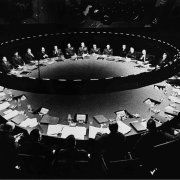Disruption The new normal
How to stay on top of politics that can impact your business
In a global political environment that is veering towards the highly unpredictable, government relations and keeping track of the political players with the potential to impact your business has never been more important, or challenging.
2015 and 2016 will be remembered as years of seismic change and upheaval to the comfortable traditional political orthodoxy of the Western world. Brexit, Trump, the rise of the right in Europe, failed plebiscites or referenda in Greece, Italy and Colombia, a belligerent populist in the Philippines, the list goes on.
Here at home, a first-term Coalition Government that was expected to romp home in a double dissolution election was lucky to survive. At a State level, we are becoming accustomed to one-term governments.
Much has been, and will continue to be, written about the root causes of this disruption to the previously somewhat predictable course of politics. However, for businesses with exposure to State or Federal Government policies and regulatory actions, the key challenge is to stay both on top of and in touch with the key players on all sides of politics and what drives them.
In such volatile times, it is insufficient to be cosy with one side or another in a dominantly two party system. Equal attention needs to be paid to both major parties, and now to the minor players who are increasingly carrying critical influence. Further, if the right levers are to be used when policy or regulatory proposals present a business threat, there needs to be an understanding of the competing agenda within the parties.
For many businesses, political observation and developing relationships within the political sphere are not core functions. Given the almost frantic modern pace of political change, even some political commentators struggle to remain fully abreast of the sometimes labyrinthine allegiances, dependencies and deal-making; that is where expert advice is becoming valuable.
In the effort to garner fickle electorate support, politicians will sometimes consider actions and reactions with unintended consequences, or scant consideration of commercial impact. Careful and considered engagement may then be required to avoid outcomes that can damage particular businesses or sectors. Simple opposition to a proposal is most often not enough. Clear and well-thought through proposals need to be put forward, cognisant of the political agenda at play and of the need to find workable solutions.
RMK+Associates have spent decades developing a detailed understanding of how our system of government works and building the networks necessary to facilitate political engagement. For businesses with a need to engage with government, or even to simply understand the political drivers and administrative processes, seeking such expert counsel could help avoid significant difficulties emanating from unforeseen political action.




